Content
- Possible reasons
- BPPV
- Migraine
- Vestibular migraine
- Transient ischemic attack
- Perilymphatic fistula
- Semicircular canal dehiscence syndrome
- Meniere's disease
- Kogan syndrome
- Rotational occlusion of the vertebral artery
- Psychogenic dizziness
- Cerebellar stroke
- Inner ear infections
- Osteochondrosis
- Brain tumors
- Vertebrobasilar insufficiency
- Multiple sclerosis
- Treatment methods
- BPPV
- Meniere's disease
- Vestibular neuronitis
- Multiple sclerosis
- Vestibular migraine
- Possible consequences and complications
- Video about vertigo when turning head
If a person has dizzy at every turn, a sharp movement of the head or under other circumstances, then we are talking about a fairly common symptom with which people often go to the doctor.
The reasons for such dizziness can be many, ranging from diseases of the inner ear, ending with osteochondrosis, impaired blood circulation in the brain, simple fatigue and many other disorders. The problem with self-diagnosis is that most of the symptoms are very similar, so it is extremely difficult to determine the exact disease without the help of a doctor.
Possible reasons
To determine the causes of vertigo, it will be helpful to consider several types of vertigo when turning the head, which are most common in medical practice.
| Type of dizziness | Description |
| BPPV | This is a condition called benign paroxysmal positional vertigo. As a rule, it appears against the background of skull injuries or infectious diseases. Also, BPPV can develop with poor blood flow to the brain. Symptoms are most severe when a person turns their head and gets out of bed. The duration of dizziness is no more than 1 minute. |
| Psychogenic dizziness | Problems tend to appear if a person suffers from panic disorder. However, he has additional symptoms in the form of heavy sweating, shortness of breath and problems with balance. |
| Non-systemic dizziness | Additionally, a person experiences a loss of balance, he complains of nausea, cold sweat, general fatigue. Vertigo is most often caused by anemia, infection, or severe blood loss. |
| Light-headedness | This is a severe form of dizziness, which is accompanied by a decrease in blood pressure, increased heart rate. In this case, the head can be dizzy when turning, due to overwork, heatstroke, too long fasting. Also, women can suffer from light-headedness during pregnancy. |
As a rule, patients visit a doctor with central or systemic vertigo, which is a symptom of a wide variety of diseases. More often, the balance system, which includes the vestibular apparatus, eyes and receptors, is responsible for dizziness. All these 3 parts work in harmony and send appropriate impulses to the human brain.
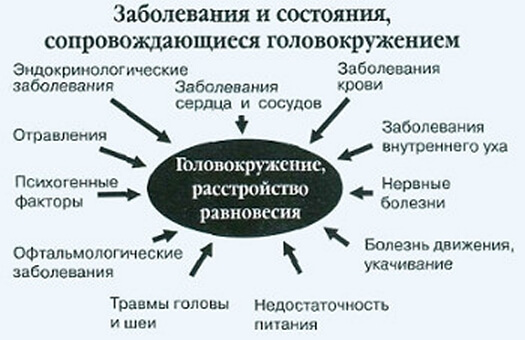
If at least one of the components does not receive the necessary impulse, then this leads to violations. Accordingly, a person may experience dizziness. When the reception of such signals is distorted, for example, against the background of receptor stimulation, misconception about the position of the human body and what specific movement it does. Therefore, dizziness is so often accompanied by loss of balance.
There are over 80 diseases and disorders that can trigger this condition. Therefore, it is extremely important to diagnose in a timely manner and describe in detail to the doctor all symptoms other than dizziness.
BPPV
This is not only one of the types of dizziness, but also a very common abnormality, which is characterized by irritation of receptors in the vestibular apparatus. Otolith stones located in the semicircular canals of the inner ear fall into them. The danger of the condition is that it can develop completely spontaneously.
Moreover, people of any age suffer from it. According to medical practice, most often pathology develops at the age of 50 and older. But problems can also arise in the case of a recent injury or infection, even if the patient is a teenager.
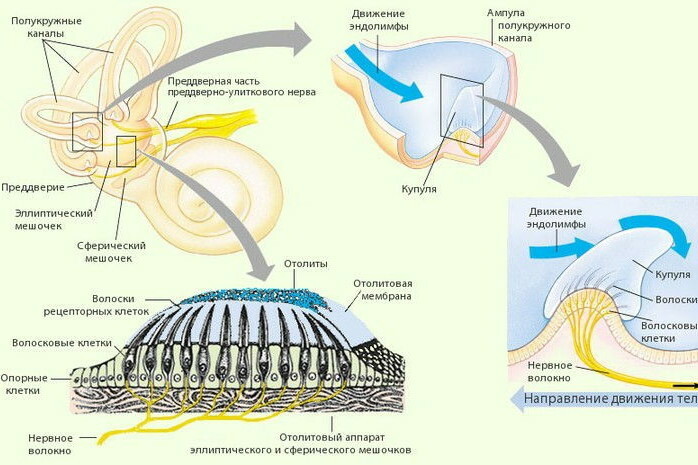
It is worth paying attention to the main symptoms of benign positional vertigo:
- Dizziness when the person turns or tilts their head. In this case, the symptomatology can manifest itself both in a horizontal and in a vertical position.
- The onset of weakness, which usually lasts a few minutes after dizziness.
- Attacks of nausea and vomiting.
In this case, dizziness cannot appear in series or only once and disappear for a long time.
Migraine
When you turn your head, your head is sometimes dizzy against the background of severe pain that develops with migraines. During such attacks, there is a change in blood circulation in the brain. This means that the control of the vestibular apparatus is also significantly impaired. Because of this, dizziness develops mainly when turning the head. As a rule, they occur with very severe pain in the occipital region, when a person loses balance, complains of vomiting.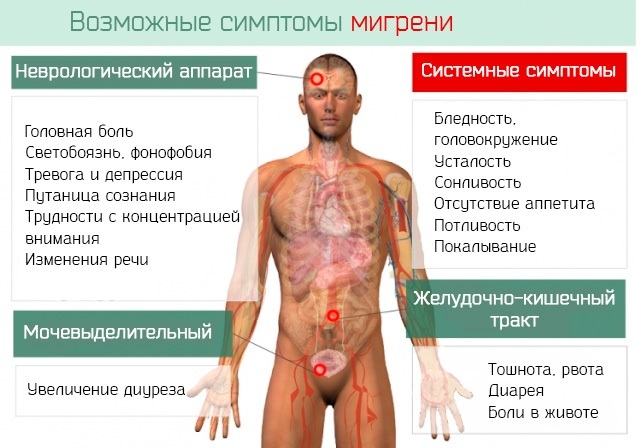
Additional symptoms of migraine include intolerance to light and loud sounds. Over time, some people get used to pain syndromes and complain only of dizziness and nausea. Also, the absence of pain and the presence of exclusively dizziness is characteristic of children who are just beginning to develop migraines.
Vestibular migraine
This is a relatively rare condition, although it is the most logical explanation for recurrent vertigo. Moreover, their intensity can be different. Dizziness is accompanied by increased weakness and migraines.
The duration of an attack can range from several minutes to several hours, and sometimes days. However, at the same time, the patient does not experience noise or ringing in the ears, the hearing remains normal. Vestibular migraine can also develop in the presence of a common migraine, as well as for other reasons for the appearance of dizziness.
Transient ischemic attack
This condition is very similar in its characteristics to a stroke. But it is not so dangerous, as it passes without the intervention of doctors and at the same time does not damage the brain. Dizziness and a change in balance can be distinguished from the symptoms of TIA.
Also, people often complain of numbness on the right or left side of the body. A person's speech becomes slurred. At the same time, he cannot even concentrate in order to clearly formulate his thought. Double vision or complete loss of vision may appear. Some patients experience temporary memory loss and find it difficult to swallow.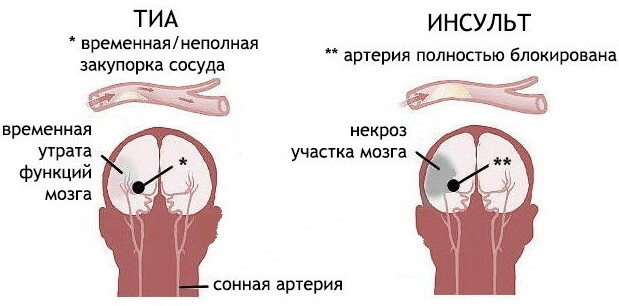
As a rule, this happens due to the formation of a blood clot or its particles, which clog the blood vessels of the brain. The closure of such a vessel can last as long as a few minutes or 2-3 hours. Patients who have undergone such attacks are at risk and should take all measures to prevent the development of a stroke. They are also advised to periodically undergo a cardiovascular examination.
Perilymphatic fistula
A similar problem appears if a person has suffered a traumatic brain injury or the so-called barotrauma, that is, damage from a strong drop in atmospheric pressure. In such a situation, severe dizziness develops.
Additional symptoms include hearing impairment that occurs with certain activities, such as sneezing, lifting weights, or coughing. This is because perilymphatic fistula severely damages the membranes of the middle and inner ear.
The problem is that such a condition is very difficult to diagnose and can only be detected using computed tomography. But very often the deviation goes away on its own. To speed up the healing process, patients are advised to lie more in bed and avoid any overstrain.
Semicircular canal dehiscence syndrome
Turning the head makes you feel dizzy in case of an abnormality called Minor's syndrome. Dizziness occurs not only when turning the head, but also when a person coughs, sneezes, or takes certain medications.
Additionally, he may complain of nausea. Some people experience hearing impairment. The disease is characterized by the fact that the bone that covers the superior semicircular canal becomes thinner and may even disappear completely. This leads to alarming symptoms. But such a deviation is very rare.
Meniere's disease
With the development of pathology, patients experience paroxysmal dizziness, which are accompanied by deafness in one ear. If you do not take any measures, it can lead to complete hearing loss. The disease is quite rare, so the exact reasons for its development are still not known. There is a theory that sometimes Meniere's disease develops against a background of trauma, allergic reactions, or viral infections.
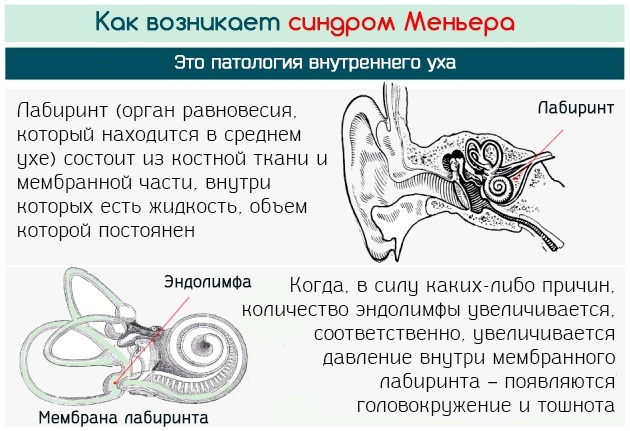
The vertigo attacks are very severe and can last from several hours to several days. At the same time, patients complain of severe tinnitus, vomiting and nausea. A feeling of pressure appears in the ears. Such attacks can last for several weeks and then do not appear for years.
Kogan syndrome
This is an even rarer disease of the autoimmune type. It is characterized by opacification in the middle or deep layer of the eyeball membrane (cornea). With the development of such a disease, seizures appear similar to those that can be observed in Meniere's disease.
That is, the patient develops dizziness, tinnitus, nausea, balance problems. Also characteristic of this type of autoimmune disease is the illusion of environmental fluctuations. Pathology is very difficult to treat.
Rotational occlusion of the vertebral artery
Also, this pathology is called archer's syndrome. In this case, dizziness appears when a person turns his head to one side. The syndrome is characterized by compression of the vertebral artery. This is usually caused by some kind of degenerative disease of the spine. Similar symptoms are observed in the congenital form of formal stenosis.
Psychogenic dizziness
This is a fairly common abnormality, which also belongs to one of the varieties of dizziness. In this case, the person does not actually experience problems, but it seems to him that he is dizzy. This is due to problems in the functioning of the vestibular apparatus.
Patients complain of a feeling of clouding in the head, the consciousness will stop confused. Periodically, light dizziness appears, due to which a person develops a fear of losing consciousness and falling. As a rule, seizures appear spontaneously, but they can also appear in the event of a stressful situation (for example, if a person is in a closed and small space).
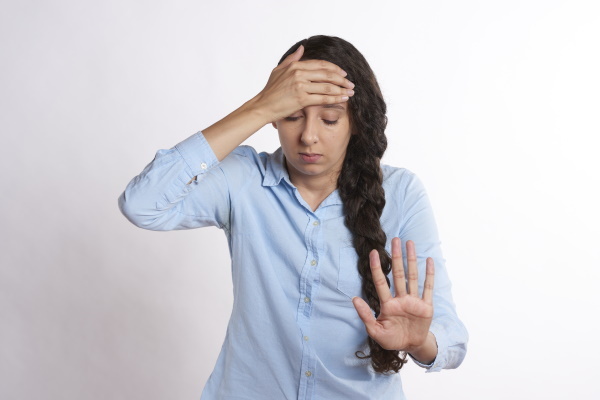
Also, some patients complain of a lump in the throat and sore throat. Against the background of a panic attack, shortness of breath may develop, as well as a constant feeling of anxiety and irritability. This affects the person's sleep and daily life.
Experts attribute psychogenic dizziness to one of the manifestations of vegetative vascular dystonia. Accordingly, the treatment is prescribed so as to stop the symptoms of VSD. That is, most often doctors give preference to sedatives or psychotherapy.
Cerebellar stroke
When you turn your head or if your head is spinning while performing other actions, you should exclude the possibility of a cerebellar stroke. It is the part of the brain that is responsible for balance and coordination of human movements.
A stroke in this case is characterized by a very sharp attack of dizziness, vomiting, and loss of the ability to control the limbs. The man falls to one side. At risk are people over 60 years old, as well as those patients who have a predisposition to strokes. These include those who suffer from diabetes or hypertension.
Inner ear infections
Pathology includes vestibular neuritis, as well as inflammation of the labyrinth. These are the consequences of infections, during which the inner ear or the nerve that connects the inner ear and the brain becomes inflamed. This disrupts sensory communication and, accordingly, a person's hearing is significantly impaired, problems with balance appear.
With vestibular neuritis, patients experience dizziness, problems with feeling in space. Rapid movement of the eyeballs is a characteristic feature. In this case, there are usually no problems with hearing.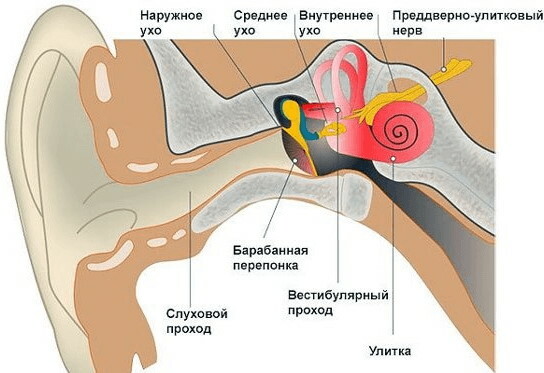
If a person suffers from inflammation of the labyrinth, then this suggests that the infection has affected both branches of the vestibular nerve at once. In addition to hearing impairment and changes, patients complain of frequent dizziness, which can appear even with a slight turn of the head. Sometimes it comes to the point that the patient has to fix his head with his hands in order to exclude seizures.
Osteochondrosis
When you turn your head, you also feel dizzy against the background of degenerative diseases of the cervical spine, to which doctors refer to osteochondrosis. With its development, quite frequent dizziness may appear. Additional symptoms include unsteady gait and a feeling that everything is spinning around.
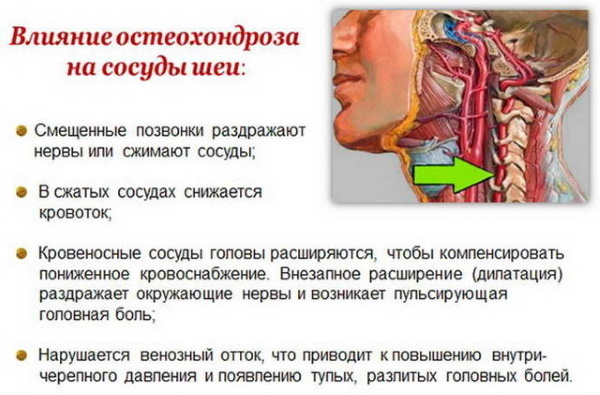
During the development of osteochondrosis, the work of extremely sensitive receptors located in the neck area is disrupted. In addition, blood circulation in the vertebral arteries may be impaired. They are known to deliver blood to those parts of the brain that are responsible for balance.
Brain tumors
In some types of these tumors, if they are located close to the inner ear, severe and progressive dizziness appears. This means that seizures are observed in a person very rarely at first, but then they become more and more frequent.
Additional signs of a tumor include hearing loss (usually in one ear), nausea, tinnitus, and headaches. In difficult situations, patients develop strabismus, paralysis of the facial muscles may appear. These are the most common symptoms of tumor development in young people and children.
Vertebrobasilar insufficiency
With the development of such a deviation, violations occur in the brain stem, cerebellum, as well as other structures, to which blood is delivered through the vertebral artery. In this case, patients have ischemic attacks. If a person has a loss of coordination and dizziness, then this may indicate a malfunction in the work of small arteries (subject to increased pressure and other abnormalities).
According to statistics, about 6% of people suffer from cerebral circulation disorders. If the pressure is normal, then this may indicate problems in the work of the labyrinth against the background of poor blood circulation. However, if a person really has vertebrobasilar insufficiency, then other symptoms of a neurological type will additionally be observed. Only dizziness with a deviation in the work of the vascular system occurs extremely rarely.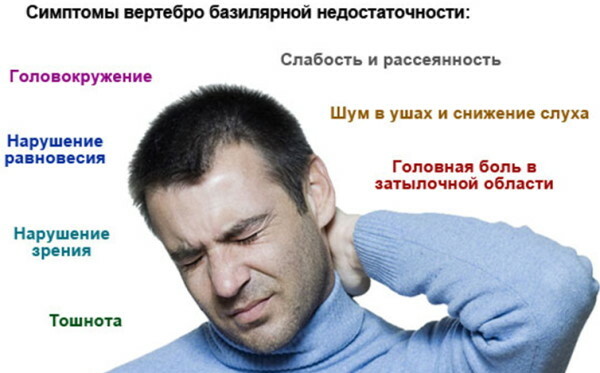
Some people associate dizziness when turning the head with the fact that the vertebral arteries can be compressed. However, such an explanation is rarely confirmed by a doctor. More often than not, the presence of severe dizziness with accompanying symptoms such as nausea or vomiting is just one signal that cerebrovascular disease is developing.
Multiple sclerosis
Dizziness may appear in patients who have already been diagnosed with demyelinating disease and central nervous system damage. Dizziness with such pathologies, as a rule, has a mixed character and occurs with a certain frequency. It is impossible to diagnose multiple sclerosis against the background of this symptom alone, therefore, an MRI of the brain is required.
Treatment methods
When you turn your head, you feel dizzy against the background of a variety of diseases. Therefore, treatment should be considered depending on the exact diagnosis made by the doctor.
BPPV
The main technique for treating this deviation is the so-called Epley maneuver. It consists in the fact that the doctor manipulates the patient's head and displaces the crystal (or otolith) to a less sensitive area.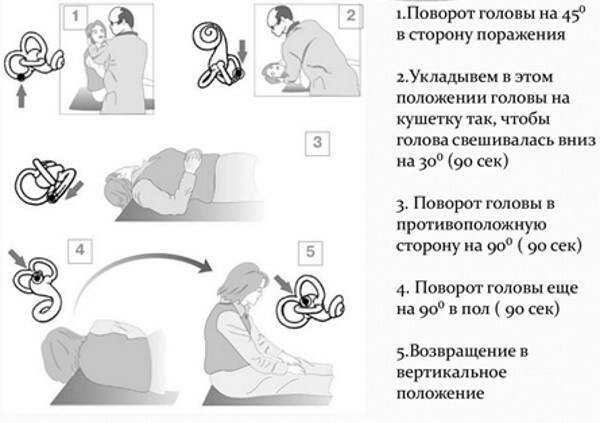
However, this treatment may be ineffective. In this case, you need to additionally resort to exercises that the patient can perform independently at home. For example, Brandt-Daroff gymnastics shows good results. Classes are held several times a day, the course of treatment is at least 3 weeks.
But drugs rarely give any positive dynamics in BPPV. If none of the treatment methods allow you to get rid of the deviation, then an operation is performed. However, in the case of surgical intervention, there is a high risk that after this a person will have facial nerve injuries, he may completely lose hearing in one ear. With this disease, removal of the vestibular nerve or selective neurectomy can be performed.
Meniere's disease
For the treatment of seizures, the doctor prescribes vestibulosuppressants. After the attack is removed, it is important to adhere to preventive measures, that is, to closely monitor that the diet is low in salt. It is also important to stop drinking alcohol, caffeine, and diuretics. If taking drugs does not have any positive dynamics, then it is required to inject the vestibulosuppressor directly into the ear canal. In difficult situations, an operation is performed.
Vestibular neuronitis
As a rule, in the case of such a diagnosis, hospitalization of the patient is required, but sometimes outpatient treatment is sufficient. Therapeutic measures should be aimed at minimizing the frequency of dizziness, relieving the patient from vomiting and improving the functioning of the vestibular system.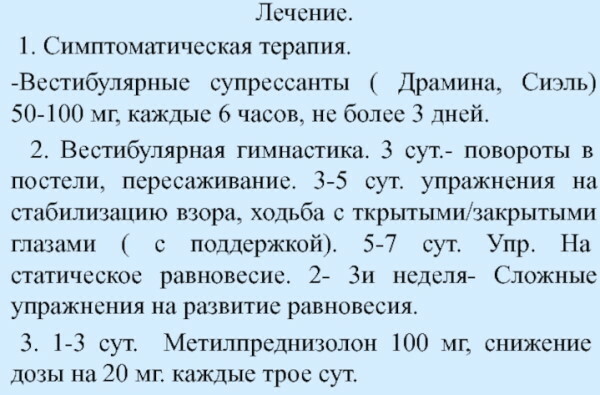
As medications, your doctor may prescribe vestibular suppressants. If the patient has severe vomiting, then these funds can be administered by injection. The duration of treatment is always different, since it directly depends on the complexity and intensity of dizziness. But, as a rule, no more than 3-4 days is enough. Additionally, your doctor may prescribe corticosteroids and antiviral drugs if you suspect a person has a middle ear infection.
Multiple sclerosis
In the process of treating this disease, the most important thing is to quickly eliminate the symptoms, which to a large extent spoil a person's life; accordingly, coordination and hearing are required. Treatment depends on the exact cause of the dizziness. In everyday life, it is important for a person to avoid stress and also try to reduce the risks of injury.
When the first symptoms of multiple sclerosis appear, the doctor may prescribe vestibulolytics. The course of taking them is quite short and is determined solely by the doctor. If you take them longer than the specified period, then depression of the nervous formations may occur. To increase the effectiveness of therapeutic measures, it is recommended to periodically perform exercises to restore the vestibular apparatus.
Vestibular migraine
When treating this pathology, it is first necessary to eliminate the provoking factors, and then stop the seizures. The doctor may prescribe anti-migraine drugs as well as analgesics.
Possible consequences and complications
As can be seen from the foregoing, the appearance of dizziness is characteristic of a wide variety of diseases and deviations. Some of them are mild and do not disrupt a person's daily life. But if hearing problems appear and a person cannot stand normally, complains of bouts of vomiting and nausea, then we are talking about more serious problems.
If you do not consult a doctor and do not carry out timely treatment, then this can lead to complications. For example, there is a risk of hearing loss and the development of a brain tumor. Such conditions threaten the patient's life.
If the head is spinning, it cannot be ruled out that the person is overworked or slept poorly. This is the most innocuous explanation for the symptom appearing when the head is turned. If there are no additional complaints and the symptom appeared only 1-2 times, then it is worth revising your daily regimen and diet. In case of recurrent seizures, it is imperative to undergo an examination.
Video about vertigo when turning head
Malysheva on dizziness when turning the head:



